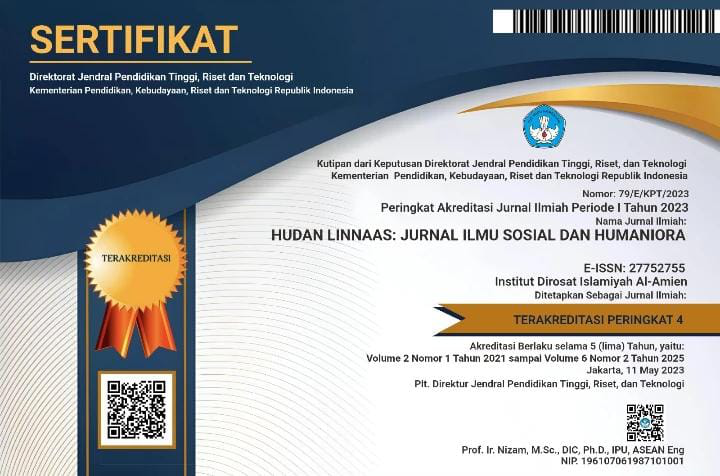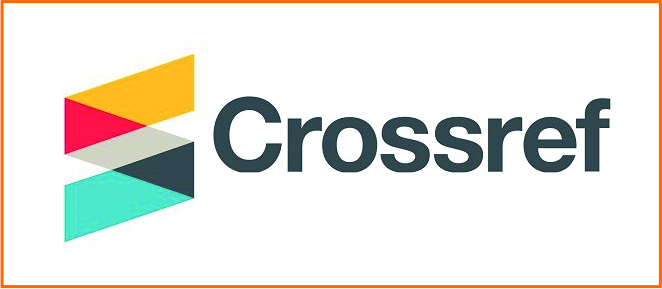PSIKOTERAPI ISLAM UNTUK KORBAN PENYALAHGUNAAN NARKOBA
DOI:
https://doi.org/10.28944/hudanlinnaas.v6i1.1656Keywords:
Islamic Psychotherapy, Victims Of Drug Abuse, Mandatory Reporting InstitutionAbstract
This study is intended to determine the application of Islamic psychotherapy as a form of rehabilitation for victims of drug abuse at the Mutiara Lentera Mataram Mandatory Reporting Institution (IPWL), as well as to find out the supporting and inhibiting factors for the application of Islamic psychotherapy at the Mutiara Lentera Mataram Mandatory Reporting Institution (IPWL).The research method used is qualitative research where data collection techniques through observation, interviews and documentation methods with 5 subjects consisting of 4 victims of drug abuse and 1 addiction counselor. The results of the study found that the application of Islamic psychotherapy at the Mutiara Lentera Mataram Mandatory Reporting Institution (IPWL) included applying congregational prayer, dhikr, proper ablution and learning to read the Qur'an as an effort to restore the cognitive, affective and psychomotor functions of victims of drug abuse. In addition, there are supporting factors for the implementation of Islamic psychotherapy including: family (parents, siblings, friends), the environment (community and IPWL officers) is a motivator that fosters confidence and enthusiasm in victims of drug abuse, while inhibiting factors such as mood when carrying out Islamic psychotherapy activities, lack of professionals in the field of Islamic psychotherapy who will help clients, hampered by client activities outside which sometimes interfere with the schedule of Islamic psychotherapy activities that have been determined.
References
Adz-Dzaky, Hamdan Bakran. 2001. Konseling Dan Psikoterapi Islam. Yogyakarta: Fajar Pustaka Baru.
Afif, Muhammad, and Uswatun Khasanah. 2018. “Urgensi Wudhu Dan Relevansinya Bagi Kesehatan (Kajian Ma’anil Hadits) Dalam Perspektif Imam Musbikin.” Jurnal Studi Hadis 3(2).
Andreas Putra, Arys Try. 2016. “Metode Psikoreligious Dalam Rehabilitasi (Pendidikan Dan Pembinaan Korban NAPZA Dan Miras).” Jurnal Literasi VII(1).
Habibi, Khairul. 2007. “Sistem Rehabilitasi Korban Narkoba Melalui Pendekatan Dakwah Di Yayasan Tabina Aceh Kabupaten Aceh Barat.” Jurnal Managemen Dan Administrasi Islam 1(2).
Harmathilda, Harmathilda, and Soleh Soleh. 2016. “Doa Dan Dzikir Dalam Meningkatkan Kecerdasan Emosi.” Jurnal Psikologi Islam 2(1).
Harvina, Sawitri. 2018. Determinan Berhenti Pakai Narkoba Suntik. Lhokseumawe: Unimal Press.
Jamaludin, Jamaludin. 2018. “Fiqh Al- Bi’ah Ramah Lingkungan: Konsep Thaharah Dan Nadhafah Dalam Membangun Budaya Bersih.” Jurnal Fiqh Al- Bi’ah 29(2).
Marisah, Marisah. 2018. “Urgensi Bimbingan Rohani Islam Bagi Pasien Rawat Inap.” Jurnal Bimbingan Konseling Islam 2(2).
Mas’udi, Mas’udi. 2017. “Terapi Qur’ani Bagi Penyembuhan Gangguan Kejiwaan.” Jurnal Bimbingan Konseling Islam 8(1).
Mulkiyan, Mulkiyan, and Ach Farid. 2017. “Terapi Holistik Terhadap Pecandu Narkoba.” Jurnal Konseling Religi 8(2).
Munir, Syamsul. 2013. Bimbingan Dan Konseling Islam. Jakarta: Amzah.
Mutohar, Ahmad. 2015. “Pencegahan Korban Narkoba Melalui Terapi Dzikir.” Jurnal At-Tatwir 2(1).
Suryana A, Asep, and Nur Lina. 2018. “Model Pembinaan Remaja Tentang Bahaya NAPZA Ditinjau Dari Sudut Fisiologi Otak Dan Sistem Syaraf.” Jurnal Pengabdian Siliwangi 4(1):29.
Wati, Rina Ambar. 2019. “Bimbingan Spiritual Berbasis Terapi Lingkungan Terhadap Korban NAPZA Di Panti Rehabilitasi Pondok Tetirah Dzikir.” Jurnal Bimbingan Konseling Islam Dan Dakwah Islam 16(2).
Zubaidah, Siti. 2011. Penyembuhan Korban Narkoba Melalui Terapi Dan Rehabilitasi Terpadu. Medan: Medan Estate.
Downloads
Published
Issue
Section
Citation Check
License
Authors who publish with this journal agree to the following terms:
- Authors retain copyright and grant the journal right of first publication with the work simultaneously licensed under a Creative Commons Attribution-NonCommercial-ShareAlike 4.0 International License that allows others to share the work with an acknowledgement of the work's authorship and initial publication in this journal.
- Authors are able to enter into separate, additional contractual arrangements for the non-exclusive distribution of the journal's published version of the work (e.g., post it to an institutional repository or publish it in a book), with an acknowledgement of its initial publication in this journal.
- Authors are permitted and encouraged to post their work online (e.g., in institutional repositories or on their website) prior to and during the submission process, as it can lead to productive exchanges, as well as earlier and greater citation of published work.









